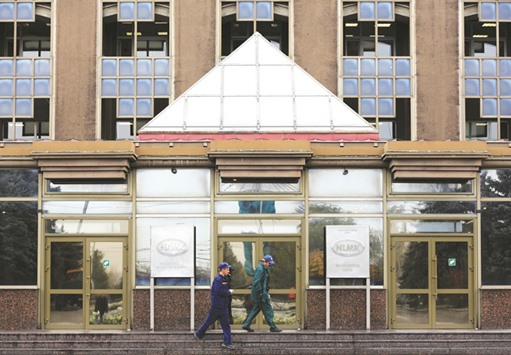For some Russian companies, buying back debt at a loss makes perfect sense right now.
Two steelmakers and a shipping company announced plans in the space of 48 hours this week to sell debt in order to repurchase $3.34bn of bonds due between 2017 and 2019. While buying back old notes when they’re trading at higher than their face value seems counter-intuitive, selling new securities at the lowest yields in three years may save them cash in the longer term.
Behind the strategy is a desire by some companies to take the sting out of looming bond payments before a US interest- rate increase as early as this month makes them more burdensome. Russian companies face a $65bn wall of maturing debt in 2017 and 2018, the legacy of a borrowing boom from the days before the US and Europe imposed sanctions on Russia over the crisis in Crimea. If the penalties are extended after they lapse on July 31, access to the Eurobond market may remain sporadic.
“The scheme might look odd on the surface,” said Fedor Bizikov, Moscow-based money manager at GHP Group, who is considering tendering bonds in the buybacks. “But if you look at the both sides of the equation, everyone wins. Investors win now by locking in profits. Borrowers will win tomorrow by fixing current lower rates.”
Investors chasing yield have propelled a wave of mega-deals from Argentina to Qatar this quarter as the average yield paid by emerging-market borrowers tumbled to 5.34%, down from an almost five-year high of 6.5% on Jan. 20, according to Bloomberg index data.
Novolipetsk Steel said it would tender for “any and all” of $708mn bonds due in 2018 at 103.625% of face value and $471mn of 2019 bonds at 104.5%. Shipping operator Sovcomflot, a state-owned company set for privatization later this year, wants to repurchase $800mn of 2017 bonds at 104.125% of face value, representing a 2 percentage-point premium. Evraz is also seeking to buy back four issues that mature in 2017 and 2018.
“Levels for tendering debt have been so far very generous for emerging-market investors and this makes a deal quite attractive from investors’ eyes,” said Sergey Dergachev, a senior money manager who helps oversee about $13bn of assets at Union Investment Privatfonds GmbH in Frankfurt and owns some of the debt being tendered. “It is a good opportunity to get cheap and liquid exposure to Russian credit.”
Lukoil and state-backed Russian Railways are among companies “most likely” to tap new Eurobonds, possibly coupled with buybacks of existing issues, Stanislav Bozhenko, head of fixed-income research at Otkritie Capital in Moscow, said in a note to clients.
Not all companies are convinced by the strategy. Phosagro turned down an offer by investment banks to arrange a buyback and new bond sale, Chief Executive Officer Andrey Guryev said on the sidelines of a conference in Moscow. The fertiliser maker prefers bank loans, he said on Wednesday.
A rebound in oil, the country’s biggest export, is boosting demand for Russian debt amid optimism the central bank will resume a rate-cutting cycle as soon as this month. That’s pushed the average yield for Russian corporate Eurobonds to 6.24% on Thursday, levels last seen before penalties were imposed in 2014 on the nation’s biggest companies over the Ukraine conflict.
“They are proactively managing their liabilities for the next two to three years in extremely favorable market conditions,” said Vadim Gazarian, London-based head of debt origination for Russia and the Commonwealth of Independent States at ING Bank, adviser to all three of the issuers.
Corporate Russia has cut its debt burden to the least in six years, with the ratio of net borrowing currently at 0.6 times earnings before interest, taxes, depreciation and amortisation for companies listed on the Micex Index, according to data compiled by Bloomberg.
While the demand helped Russia’s government return to the bond market last month for the first time since sanctions were imposed, issuers may struggle to issue at similar yields in the future. With its reliance for energy for two thirds of its export revenue, the economy is struggling to emerge from recession as crude languishes at less than half its value of two years ago. At the same time, the extension of sanctions by the US and Europe implies political risk premiums even for companies that aren’t blacklisted.
“It’s a very favourable moment,” said Andrey Solovyev, global head of debt capital markets at VTB Capital in Moscow, the arranger of two of the three transactions. “Nobody knows how long it will last, so everybody’s trying to take advantage of it to extend the maturity of the bond portfolio.”

Workers pass the entrance to administrative offices at the Novolipetsk Steel plant in Lipetsk, Russia. Novolipetsk said it would tender for ‘any and all’ of $708mn bonds due in 2018 at 103.625% of face value and $471mn of 2019 bonds at 104.5%.
